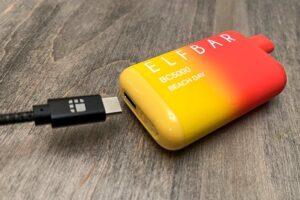Can you take a portable charger on an airplane? The short answer is yes, you can. Whether you’re a frequent traveler or planning your first flight, keeping your devices powered up is essential. In this blog article, we’ll discuss the regulations and guidelines surrounding the use of portable chargers on airplanes. We’ll provide you with the necessary information so that you can travel with peace of mind, knowing that your electronic devices will stay charged throughout your journey. So, if you’ve ever wondered about the feasibility of taking a portable charger on an airplane, you’ve come to the right place. Let’s dive in and explore the world of portable chargers and air travel.
Can You Take a Portable Charger on an Airplane?
Traveling can be exciting, but it also requires careful planning and consideration of what you can and cannot bring on an airplane. With the ever-increasing reliance on electronic devices, many travelers wonder if they can bring portable chargers on board. In this article, we’ll explore the rules and regulations surrounding portable chargers and provide you with all the information you need before your next flight.
TSA Guidelines for Portable Chargers
The Transportation Security Administration (TSA) is responsible for ensuring the safety and security of air travel in the United States. They have specific guidelines in place regarding portable chargers and other electronic devices. According to the TSA:
1. Portable chargers are allowed in carry-on and checked baggage. However, it’s always a good idea to pack them in your carry-on so you can easily access them during your flight.
2. Portable chargers, power banks, and external batteries must be packed in such a way that they are protected from damage and cannot accidentally turn on. This can be achieved by placing them in a protective case or covering the exposed terminals with tape.
3. If your portable charger contains a lithium-ion battery, there are additional restrictions. Lithium-ion batteries with a capacity of 100 watt-hours or less are allowed in both carry-on and checked baggage. If the capacity exceeds 100 watt-hours but does not exceed 160 watt-hours, you are required to obtain airline approval before traveling. Batteries with a capacity exceeding 160 watt-hours are prohibited on aircraft altogether.
Why Are There Restrictions on Lithium-ion Batteries?
Lithium-ion batteries, commonly found in portable chargers, are known for their high energy density and can pose a fire risk if not handled properly. The TSA’s restrictions are in place to mitigate this risk and ensure the safety of all passengers.
International Travel Restrictions
If you’re traveling internationally, it’s important to note that different countries may have their own regulations regarding portable chargers. It’s recommended to check the specific guidelines of your destination country before your trip. In general, however, most countries follow similar rules to the TSA regarding portable chargers.
European Union (EU) Regulations
The European Union has specific regulations regarding portable chargers and lithium-ion batteries. As of 2021, portable chargers containing lithium-ion batteries with a capacity of up to 100 watt-hours are allowed on board. If the capacity exceeds 100 watt-hours but does not exceed 160 watt-hours, approval from the airline is required. Batteries with a capacity exceeding 160 watt-hours are prohibited.
Tips for Traveling with Portable Chargers
To ensure a smooth and hassle-free journey with your portable charger, here are some handy tips to keep in mind:
Check Airline Requirements
While the TSA and other regulatory bodies set general guidelines, individual airlines may have additional restrictions or requirements. It’s always a good idea to check the specific policies of the airline you’re flying with before your trip.
Label Your Chargers
To avoid confusion or loss, it’s recommended to label your portable chargers with your name and contact information. This way, if you accidentally leave it behind on the plane or in the airport, it can be easily returned to you.
Carry Essential Cables
Pack the necessary cables and adapters required to connect your devices to the portable charger. This will ensure that you have everything you need to charge your devices while traveling.
Purchase a Portable Charger with the Right Capacity
When buying a portable charger, it’s important to consider your specific needs. Ensure that the capacity of the charger aligns with your device’s battery requirements. This will ensure you have enough power during your journey without exceeding the allowed limits.
In conclusion, you can indeed take portable chargers on an airplane. However, it’s important to be aware of the rules and restrictions set by the TSA and other regulatory bodies. Always pack your portable chargers properly, protect them from damage, and follow any additional guidelines provided by your airline. By doing so, you can ensure a stress-free and powered-up travel experience. Bon voyage!
4 tips to know if you want to take your power bank on a plane
Frequently Asked Questions
Can you bring a portable charger on an airplane?
Yes, you can bring a portable charger on an airplane. However, there are certain restrictions and guidelines you need to follow to ensure a smooth travel experience.
Are there any limitations on the capacity of portable chargers allowed on airplanes?
Most airlines allow portable chargers with a capacity of less than 100Wh or 27,000mAh in carry-on luggage. It’s important to check with your specific airline as rules may vary.
Should I pack my portable charger in my carry-on or checked baggage?
It is recommended to pack your portable charger in your carry-on baggage rather than checked baggage. This is because lithium-ion batteries, which are commonly found in portable chargers, have a higher risk of fire when placed in the cargo hold.
Do I need to remove my portable charger from my bag during the security screening process?
Yes, you will need to remove your portable charger from your bag and place it in a separate bin during the security screening process. This allows the airport security personnel to get a clearer view of the charger and ensures it is not a security threat.
Are there any additional precautions I should take when traveling with a portable charger?
Yes, there are a few precautions you should keep in mind. Make sure your portable charger is turned off or in sleep mode during the flight. Avoid using or charging your devices while the portable charger is connected to the aircraft’s power outlets. It’s also a good idea to carry your charger’s user manual or documentation, especially if it has a high capacity.
Can I use my portable charger to charge my devices during the flight?
Yes, you can generally use your portable charger to charge your devices during the flight. However, it’s advisable to check with the airline first, as some carriers may have specific guidelines regarding the use of portable chargers during the flight.
Final Thoughts
In conclusion, can you take a portable charger on an airplane? Yes, you can. Portable chargers are allowed in both carry-on and checked baggage, according to the Transportation Security Administration (TSA). However, there are a few guidelines to keep in mind. Make sure the charger is properly protected to prevent damage or short-circuiting. It’s also essential to check the capacity of the charger, as airlines may have restrictions on lithium-ion batteries. By following these guidelines and packing your portable charger safely, you can bring it with you on your next flight without any issues. So, can you take a portable charger on an airplane? Absolutely, just remember to follow the guidelines and enjoy a fully charged device during your journey.




